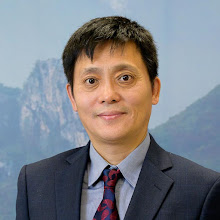Kikuchi disease is a very rare disease, also known as histiocytic necrotizing lymphadenitis. It was discovered in Japan by M. Kikuchi and Fujimoto in 1972. It is relatively common in Japan, occasionally reported in other parts of Asia, very few reports in Europe and North America. The reason of this disease is unclear, and there are two hypotheses of infection and autoimmune. The main symptoms of this disease are fever, swollen lymph nodes, Skin rash and headache. It is easy to be misdiagnosed as lymph node tuberculosis [1], lymphoma, systemic lupus erythematosus (SLE), etc. Only pathological biopsy can confirm the diagnosis. Western medicine currently does not have specific treatments for this disease, and non-steroidal anti-inflammatory drugs (NSAIDs) can be used to relieve lymph node tenderness and fever. In severe cases, corticosteroids can be applied [2].
I have treated one case Kikuchi disease with Chinese
herbal medicine and acupuncture few months ago. The case report as follows:
Mr. L, Male, 43 years old, married, Asian, Engineer .
Initial consultation: 7th November 2017. Chief Complaint: Right neck
lymph node swollen and pain, accompanied night sweats for 3 weeks. The patient found the right submandibular
lymph node pain 3 weeks ago; it enlarged gradually, accompanied by headache and
fever. His temperature used rise up to 38-39 ℃. He sweating a lot at day and night time. His
appetite was reduced, feels slightly nausea. His bowel movement is basically
normal and the urine is yellowish. Poor sleep due to night sweat.
Physical examination: an enlarged
submandibular lymph node can be reached, the size was about 2.5cm; felt hard and
fixed. His tongue was greasy and the
pulse was slightly slippery and rapid.
Diagnosis of traditional Chinese medicine: LuoLi (瘰疬). Syndrome differentiation: Hyperactivity of fire due to yin deficiency;heat & phlegm accumulating.
Treatment principle: nourishing yin and clearing heat, dissipating
phlegm and resolve mass.
Prescription: Modified Qinghao Biejia Tang
Qinghao 10g, Digupi 10g, Zhimu 10g. Shudihuang 10g, Mudanpi 10g,
Qinjiao 10g, Huangqin 10g, Huangbai10g, Xuanshen 10g, Huzhang 10g, Gancao 6g. 7
bags; boiled one bag per day, oral taken twice a day.
Acupuncture points: Reduce manipulation on Hegu(LI4), Quchi(LI11),
Dazhui (DU14), Fuliu (KI7), Fenglong (ST40); Tonified manipulation on Zhaohai
(KI6), Sanyinjiao (SP6), Taixi (KI3).
Second visit: 1st
December, 2017
His heat was reduced; the body temperature dropped below 37 °C. Patient
still have over sweating, accompanied by hot flashes in the afternoon, dry
mouth. His appetite was better than before. He lost 3 kg body weight. His neck lymph node was as swollen as before.
His tongue was red with less coating. Pulse was wiry and rapid. Repeat
prescription was given of 7 bags. Acupuncture points were the same as before.
Third visit: 13th January 2018
Sweating and hot flashes significantly improved,temperature back to normal. On 18th December, he underwent
lymph node surgery in the hospital. Pathological biopsy didn’t find cancer
cells. The pathological diagnosis was: Kikuchi disease. After the operation,
the patient felt weakness and exhausted. His tongue was pale and pulse was
thready. Modified Danggui Buxue Tang was given to supplement Qi and blood, and
to clear the remaining evil. Prescription: Danggui 10g, Huangqi 10g, Baizhu10g,
Xuanshen10g, Zhimu 10g, Huangbai 10g, Banzhilian 10g, Fuling 10g, Gouqizi 10g,
Gancao 6g. Boiled 1 bag, drink the decoction twice a day for 7 days. Acupuncture points are changed to: Zusanli
(ST36), Qihai (RN6), Xuehai (SP10), Zhongwan (RN12), Pishu (BL20), and Shenshu
(BL23). Follow-up three months through telephone, the patient didn’t have any
symptoms.
Discussing
Because the reason of Kikuchi disease is unclear, there isn’t any specific
treatment in western medicine. A report from Taiwan showed the author use
Gegen Tang, Chaihu Guizhi Tang and Shengyu Tang to treat early, middle and
later stages of Kikuchi disease [4]. The other report from mainland
China showed classic herb formula Yinqiao San also achieved a good effect on
Kikuchi disease [5].
In my case the hot flashes and night sweats indicated yin deficiency
and internal heat. The enlarged submandibular lymph node belongs to the
"Phlegm core" or "Luoli". According to the diagnosis
principle of combine syndrome differentiation and disease, we selected nourishing
yin and clearing heat; dissipating phlegm and mass in the early stage of
this disease. Modified Qinhao Biejia Tang was applied. In this formula,
Qinghao, Digupi,, Qinjiao, Zhimu for clean asthenia heat; Shudihuang, Xuanshen
for nourishing kidney yin; Huangqin, Huangbai, Huzhang for clean heat and
detoxification; Mudanpi for cooling blood and detoxification.
His fever and night sweats were significantly relieved after treatment.
In order to clarify the western medicine diagnosis and exclude the possibility
of malignant tumor, the patient underwent lymph node surgery. Pathological biopsy proved the diagnosis. The patient showed the manifestation of qi and blood
deficiency after the operation. A modified Danggui Buxue Tang was prescript to
benefit Qi and blood, combined with Huangbai, Banzhilian to clean the remained
heat. Add Gouqizi for raises the liver
and kidney yin; Add Xuanshen for clean heat and dispel mass. After several
months of follow-up, the feedback showed a positive result.
Although this disease is a rare disease in western medicine, but its
clinical manifestations are very common in Chinese medicine’s opinion. It may
shows different syndromes at different stages. If the TCM diagnosis and
treatment principle is correct, herb selection acupuncture point selection is
accurate, it will achieve very satisfactory treatment results. Discussing
Chinese herb treatment on Kikuchi disease, it might widen the clinical vision of both
Chinese and western medicine practitioner and explore a new idea for the
treatment of this rare disease.
Reference:
- C McKenna. TB or not to be? Kikuchi-Fujimoto disease: a rare but important differential for TB. BMJ Case Reports 2017; doi:10.1136/bcr-2016-217500.
- Mahmood A. Kikuchi's disease: an unusual presentation and a therapeutic challenge. Yale J Biol Med. 2006; 79(1):27-33.
- Hyun M. Recurrent Kikuchi’s disease treatment by hydroxychlorquine. Infect Chemother. 2016; 48(2): 127-31.
- 陈俐蓉 . 菊池病中医治疗思辨. 中西结合神经医学杂志 2017; 10(1): 94-101.
- 管炜.银翘散治疗菊池病报告1例.中国中西医结合杂志 2014; 34 (5): 631-632.

